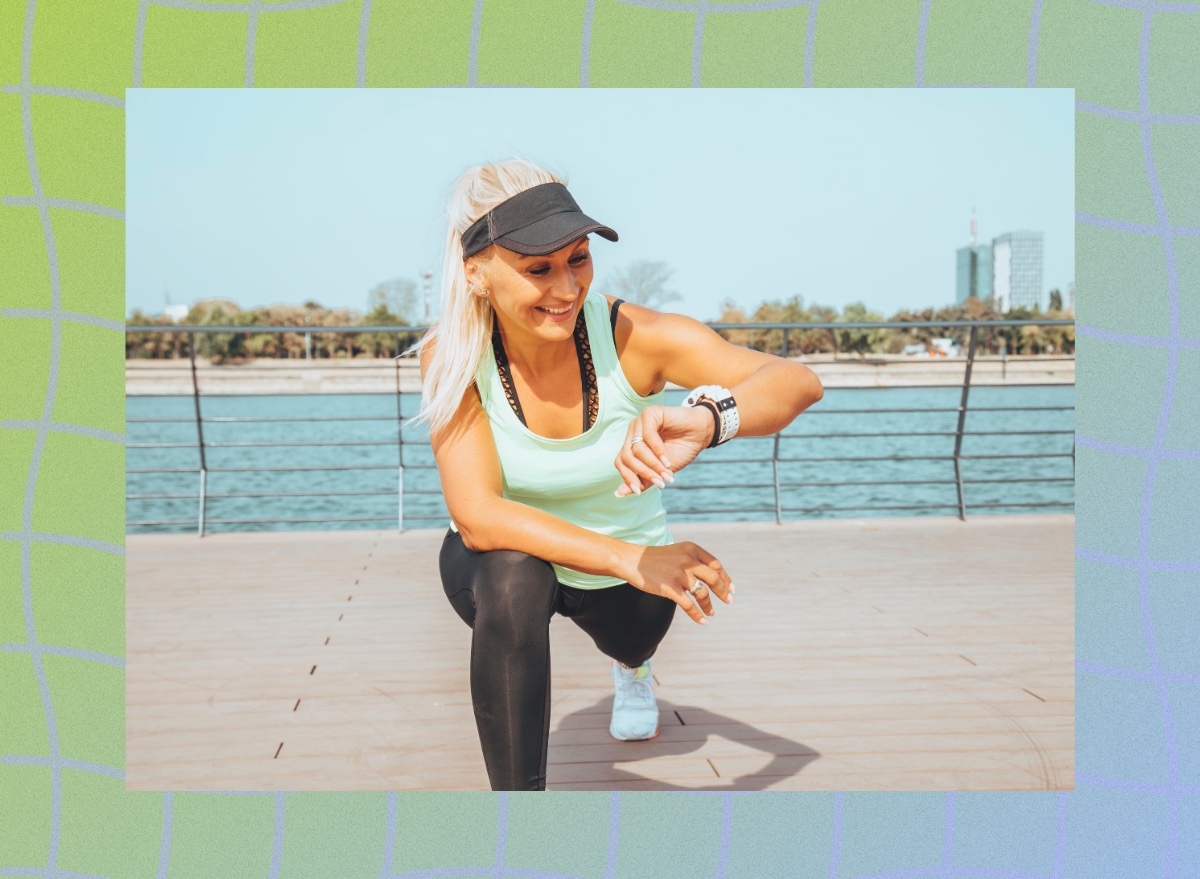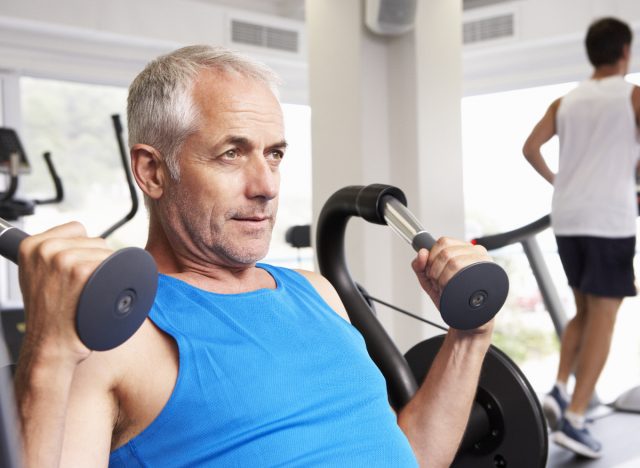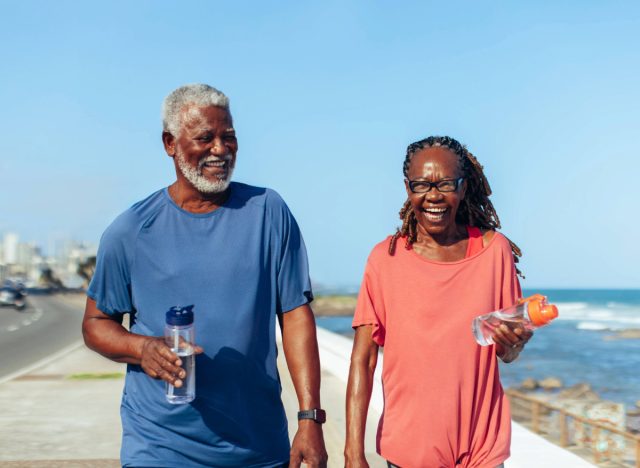Over 50? You Should Never Exercise at This Time of Day, Says Science

If you're over the age of 50 and recently decided to start working out more, chances are you probably have a lot on your mind. Like, how often should you break a sweat? Which exercises should you prioritize? How much time should you spend in the gym each day? It's a lot to consider—to say nothing of the fact that you have to account for potentially more aches and pains in your recovery, as well. One thing you may not be thinking about, however, is the time of day that's best for you to be exercising.
But the truth is, when you exercise is important, as well, and all of the prevailing science will tell you that, though exercise is largely considered beneficial at any time, there is at least one part of the day you'd be wise to avoid going to the gym. Read on to learn more, and for more exercise news you can use starting right now, check out the Secret Trick for Getting Fit in As Little Time As Humanly Possible, According to a New Study.
Avoid Working Out Within 3 Hours of Going to Before Bed

It may sound appealing to end your day with an intense workout, but exercising within three hours of hitting the sack has been shown to seriously disrupt sleep cycles. Per this study, published in the European Journal of Applied Physiology, all of the physiological excitement that comes with working out is the exact opposite of what we want to be doing as the day winds down. In other words, exercise tells our bodies to perk up, which can leave you tossing and turning until the wee hours of morning.
"When you start to move, your heart beats faster to pump more blood to your muscles. This increases blood flow overall, including the blood flow to your brain—and greater blood flow to your brain increases energy and alertness," nutritionist and exercise physiologist Gabbi Berkow, RD, told Health magazine.
Considering how important a proper night's rest is following an intense bout of exercise, a late-night workout can end up being an exercise in futility. "We exercise for a purpose: for cardiovascular health, to increase lean muscle mass, to improve endurance, and more. All of these 'goals' require sleep," W. Christopher Winter, MD, the president of Charlottesville Neurology and Sleep Medicine, told EverydayHealth.
Further research, such as this review of 23 prior studies published in Sports Medicine, found that while evening exercise in general may actually improve sleep, an intense workout one hour before bedtime can make it harder to fall asleep, reduce time spent sleeping, and decrease overall sleep efficiency. And for more life-changing exercise advice, see here for the Secret Exercise Tricks for Keeping Your Weight Down for Good.
If You Do, Your Issues Will Compound

Sleep problems among older adults are already very common. Moreover, while you may have heard over the years that older people need less sleep in general, that adage is now considered a myth. The National Institute on Aging recommends older adults get the same amount of daily sleep as their younger counterparts: 7 to 9 hours.
So, it's important to remember that while tossing and turning all night following a late night workout is no doubt annoying, it can also lead to a number of far more serious health concerns than simply feeling a bit more tired the next day. The Cleveland Clinic tells us that regular lack of sleep can lead to memory deterioration (already an issue for many older individuals), high blood pressure, and even increased risk of heart attack or stroke.
What's more sleep deprivation after 50 can literally cause you to age faster. This study, published in Brain, Behavior, and Immunity, found that a single night of poor sleep activated genes linked to the biological aging processes in a group of older individuals. If you've decided to work out more to improve your health and keep yourself young, late night workouts may actually lead to the exact opposite outcome.
Why to Work Out in the Morning Instead

Choosing to get your workouts done in the AM is a better option for a host of reasons. We all know that cognitive decline is very common the older we get. Luckily, research published in the British Journal of Sports Medicine reports that morning workouts can help improve cognition and mental sharpness in older adults.
Still not convinced? This study published in The International Journal of Cancer found that working out between 8 and 10am is linked to a lower risk of breast cancer in women and lower odds of prostate cancer in men. Researchers theorize this may be due to morning exercise's protective effect on circadian rhythms. Production of melatonin, the chemical released in our bodies when it's time to sleep, can be disrupted by nighttime workouts. Melatonin is also known to help stop the spread of cancer.
"One potential cause of cancer is circadian disruption, the misalignment of environmental cues such as light and food intake," says study coordinator Dr. Manolis Kogevinas. "It's established that regular physical activity throughout a lifetime can reduce cancer risk. This protective effect could be the most beneficial when physical activity is done in the morning."
On a related note, this study published in the Journal of Physiology concludes that morning exercise helps shift our body clocks earlier. That means you'll be more awake in the morning, and find it easier to sleep in the evening.
However, the Late Afternoon Works, Too

If you're just not a morning person, consider exercising in the late afternoon. A fascinating study published in The Journal of Strength and Conditioning Research uncovered that both strength and flexibility are usually at their highest levels in the late afternoon. The research also reports that perceived exertion is at its lowest in the late afternoon—meaning it's easier to really ramp up the intensity of a given workout without feeling overly strained.
Once again, study authors speculate these findings are linked to the human body's natural internal clock. Each morning, when you wake up, your body temperature gradually increases over the course of the day before peaking around—you guessed it—the late afternoon. And for great fitness advice, don't miss The Secret to Getting a Lean Body for Good, According to Science.








